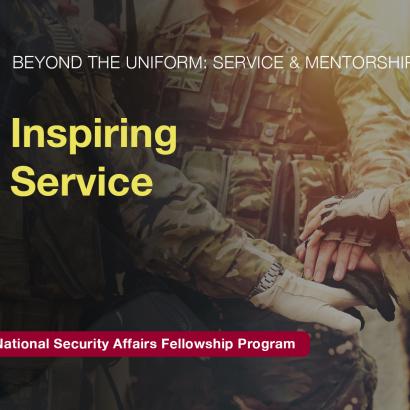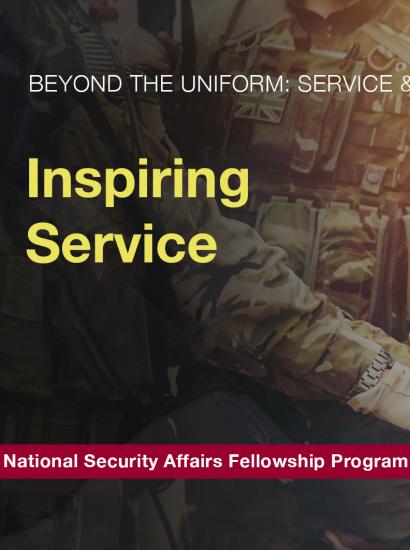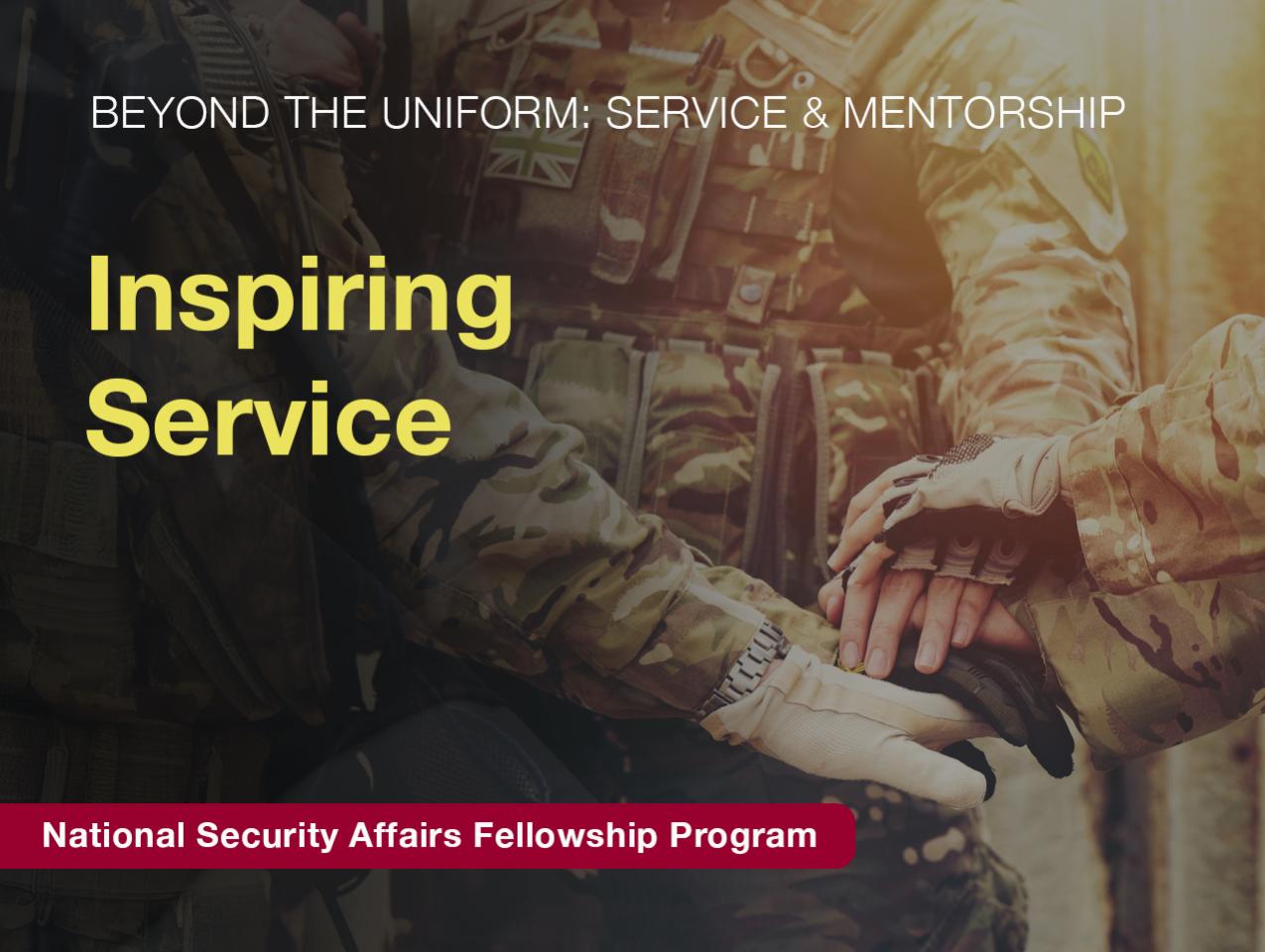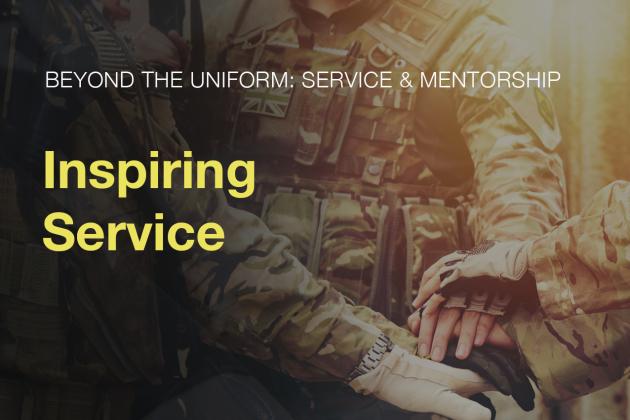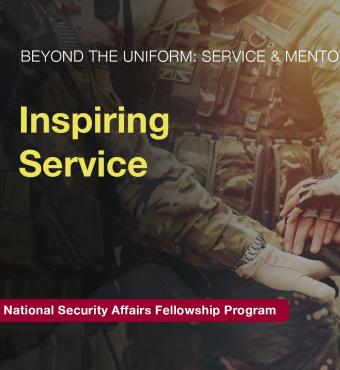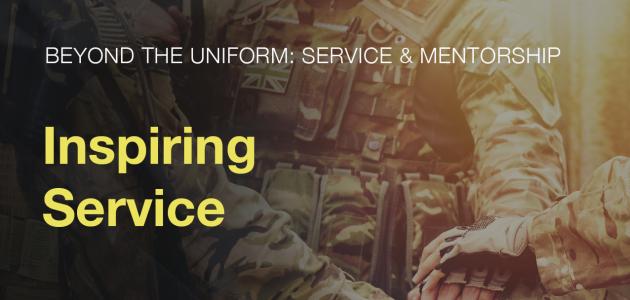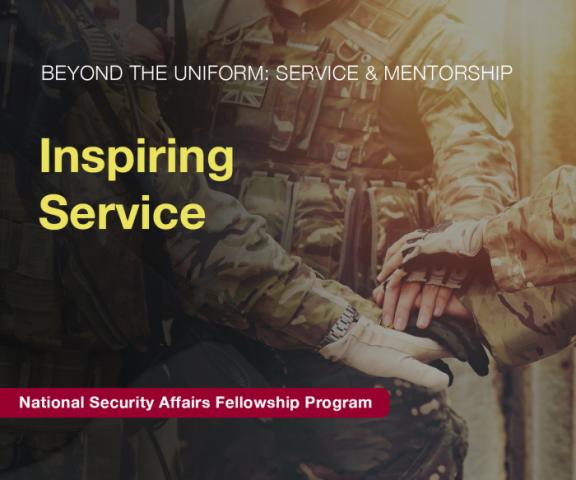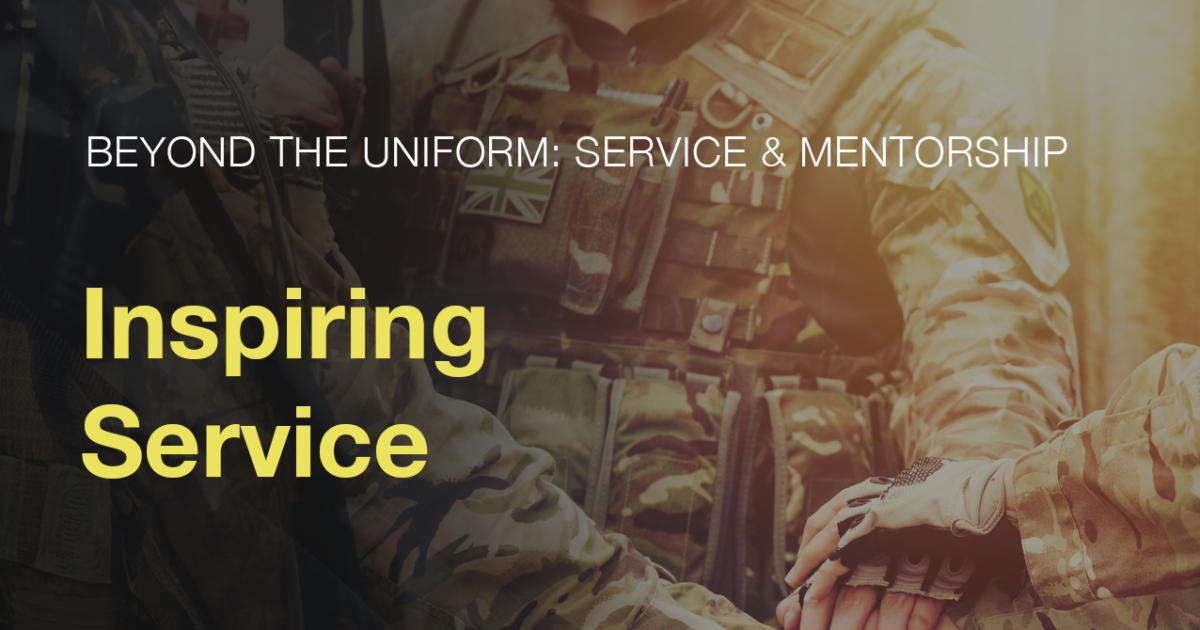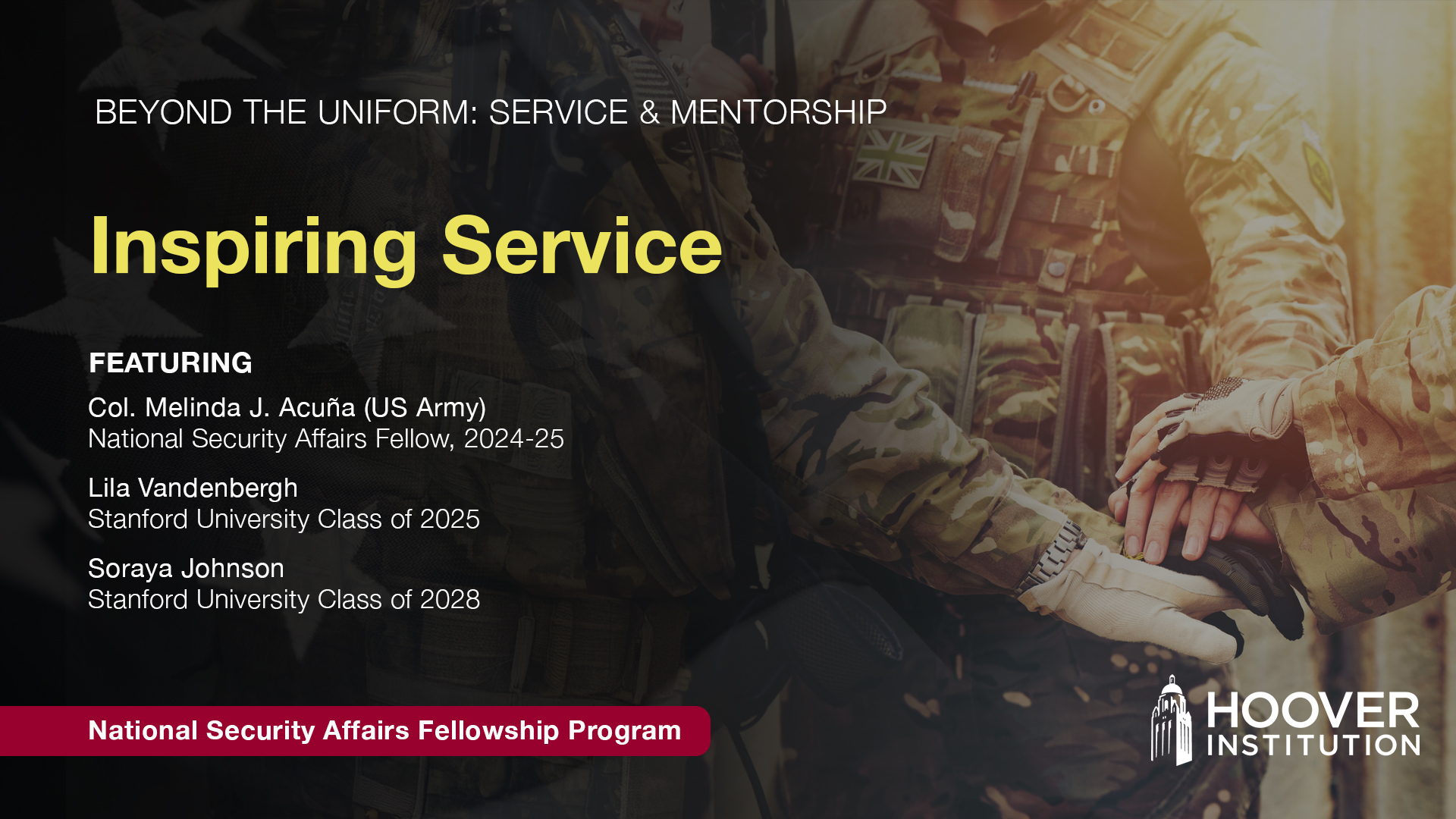Colonel Melinda Acuña (US Army) and Stanford University students, Soraya Johnson and Lila Vandenberghe, reflect on their journey through the mentorship program and how it has inspired them to serve, whether at the local level or higher.
WATCH THE VIDEO
>> Colonel Melinda Acuna: Hi, my name is Colonel Melinda Acuna. I'm a United States Army officer, and I've been in service for 21 years.
>> Lila Vandenbergh: Hi, my name is Lila Vandenbergh. I'm 21 years old, and I'm a senior at Stanford University studying international relations. And next year I will be pursuing a master's degree in public policy at Stanford.
>> Soraya Johnson: Hi, my name is Soraya Johnson. I'm a freshman and I'm 19, and I go to Stanford University, and I'm pursuing a major in political science and economics.
>> Colonel Melinda Acuna: What I see as one of the main challenges that students that maybe don't necessarily have the ability to be part of the mentorship program is access to government officials.
Or military leaders to be able to have that communication and that dialogue together. I think this NCEF mentee class has allowed us to bridge that gap, to be able to not only have conversations with other military personnel and State Department, CIA, and FBI. But also have the ability to talk to students from all levels, from freshmen to grad students to future grad students, and be able to minimize that gap.
When it comes to education and when it comes to understanding what each other does, what we can each other bring to our community. I think this program is extremely important because it helps us understand each other. It helps us get away from our old misperceptions between either what the military does in how our current students are doing right now, and what's learning.
I think it helps us to understand each other, be able to communicate. There's a lot of misconceptions that are out there. This program definitely puts us in a place where we can interact with students which are our society and which are our future. And help us let them understand what we do and who we're serving, which in turn is really, we serve our society, we serve you.
You guys will be the future policymakers, decision makers. So I think it helps you guys understand who we are. I think one of the greatest things that I'm hoping the students were able to get from this is understanding us a little bit better, right? Not just listening to what other people are saying about the military or about the government, but have that ability to question and ask us what is going on, but also give us that human factor, right?
How decisions are made. One of the things that I've enjoyed tremendously being in this program is the ability to know that students are eager to learn, are eager to ask questions. And when they don't necessarily agree with something that is being said, they can have those normal conversations without having to go into fights or arguments, but actually listen and learn from each other.
So I think a great takeaway that I can see right now is how driven you guys are. Like I said, you guys are gonna be your future. And it's really, really good that I can see it happening now. From a freshman to a senior.
>> Soraya Johnson: I would say the nature of this program is one that's very supportive and collaborative.
I think we're really encouraged to delve into our interests, to ask challenging questions, and foster relationships with not only our mentor, but also other mentees and other mentors as well. So I really found that if I had a question about something or if I found something interesting, people were really willing to like, indulge my curiosity with not only facts, but personal experiences on the ground.
So for example, I was really interested in Middle east politics, and this is something I told my mentor, Lieutenant Colonel ACuna. And so then she started inviting me to Wednesday lunches with experts on the Middle east and other academics on the Middle east and talk about her personal experiences on the ground in the Middle East.
So it's one that really fosters curiosity and encourages us to ask questions that in other contexts may be seen as inflammatory or result in very politicized responses, but here are met with genuineness.
>> Lila Vandenbergh: I completely agree. I also think that as an international relations major, a lot of what we talk about in our classes is more theory based and studying past historical examples.
And I think this program does a great job of connecting you with these mentors who have lived experiences. So it really gives you a whole worldview of national security and what working in government is like. And you get exposed to so many new perspectives that you don't get in a typical classroom setting.
>> Soraya Johnson: Yeah, absolutely. One of my papers for my class right now is about strategic achievements and failures throughout the war on terror. And I got to personally talk to Colonel Greco and talk about his personal experiences on the ground in Iraq and Afghanistan,. And face challenging questions and understand the lived experience and difficult on-the-ground decisions that have to be made beyond just theory and what academics theorize about what that experience might be like.
My mentor is Melinda here, and I feel like our relationship is one of a lot of genuineness and also vulnerability. Something that really impressed me about you is how you're willing to talk about difficulties and things you perceive as failures or hardships and barriers, but also what excites you and what you enjoy about the military.
So I always feel like I can come to you and talk about being stressed one week and having too many midterms and being overwhelmed, while also celebrating my successes with you. You always make sure to ask me about what my essay topic is and will let me talk about something I'm excited about.
You give me gifts over winter break. I really feel supported in our relationship, and I really appreciate that.
>> Lila Vandenbergh: And my mentor is Lieutenant Commander John Lee from the Navy. And our relationship has taught me a lot about the military in general, because I would never even think that I would have a mentor who was in the Navy.
I knew nothing about the Navy. I knew nothing about the other branches of the military. And so he's been so open in talking about why he joined, why he stayed in it for, I think it's 18 years, why someone like me could ever join the military if that's something that I wanted to do.
And he also is very knowledgeable about a lot of topics. So I similarly, I had a paper that was due today, actually, and it was about NATO, and I sent it to him because I was talking about increasing naval operations in the South China Sea. And I asked him for his opinion because he served there.
And he's always so open to talking about his experiences and giving advice. And even if I come to him with questions about other positions in the government, he knows so much about them and is also willing to share so much. So I've learned a lot from him throughout this year.
One of the things I learned about my mentor was why he decided to join the military. And I think that's what stuck with me the most. And he immigrated to the United States when he was young, I think he was about 13. And his dad was granted political asylum from China.
And so he came with his dad and his stepmother and his siblings. And he ultimately decided to join the military because he wanted to repay the country that saved his family. And I just thought that was so touching and so inspiring. And I think that's a reason why a lot of people end up joining the military.
And that's not something that you think of typically. And so he has this extremely impressive duty to serve and excitement about serving that I found to be really inspiring.
>> Soraya Johnson: Yeah, what I found interesting and appreciated about my mentor and also all the mentors, especially those in military service, is the commitment to the mission.
I asked a lot of questions about how my mentor Interfeld about the political climate, about changes in the commander in chief, and how changes in political environments and polarization, especially with the election at the start of our term, affected her ideas about military service. And what I found very interesting was the fact that your commitment to the mission is regardless of political waves and political changes, and it doesn't matter who the political party in power is.
What matters is serving the homeland, defending the homeland, and. And that genuine commitment to that mission, I think, really impressed me and made me understand the military and the culture a bit better.
>> Lila Vandenbergh: I completely agree. And I also think, given recent events that we've seen, that's a question that's come up a lot in class, and we've asked a lot about it.
And all of the mentors have the same response in that we're gonna serve regardless. It's our duty to our country. And that's also been extremely inspiring.
>> Soraya Johnson: Yeah, it's been motivating to stay in the field of public service. I think right now is a difficult time to stay motivated in public service because of a lot of layoffs and a lot of polarization of ele of our bureaucracy.
But seeing the genuineness in our mentors inspires me to keep at that and understand the mission of public service is still valuable and still something worth fighting for. Something that we ended up talking a lot about in our focus groups was slaying. So I think this is relevant because we understand military culture better, and that's a culture that I've been reasonably isolated from growing up.
And so learning things like what a sloppy sandwich or a soup sandwich means, as in a sloppy soldier, is just interesting because it sheds light on a culture that is generally pretty isolated from my own experiences.
>> Lila Vandenbergh: Definitely, and I think from my mentor, something I learned is that he's in the Navy.
And I thought that being in the Navy means you're on your boat the entire time, but he's actually stationed on land the majority of the time, which I thought was really interesting. And they spend a lot of time fixing their boat, which I didn't even realize that you needed.
So that was definitely very surprising to learn. And it gave me a lot of insight into what each different role in the military consisted of.
>> Soraya Johnson: I think another thing, too, that we learned about is the impact of military service on a family. Right, it's not just an individual mission to be a part of the military.
A lot of our mentors, a lot of the nsafs, have families who experience all the different placements, the hardship posts with them. So we learned from, sorry, is it Lieutenant Colonel Morabito?
>> Lila Vandenbergh: I have no idea.
>> Soraya Johnson: Lieutenant Colonel. We learned from Lieutenant Colonel Morabito, who brought his daughter and his wife in.
They talked about being homeschooled and traveling with him and how that impacted the wife's relationship to her family and their work. So it really showed me how military service and pride in military service is something that a whole family unit works through together.
>> Lila Vandenbergh: Definitely. And I think that whole panel with all the families was so inspiring too, because I think a question I've always had is, do you leave your families behind?
Do they come with you? What do the children do? What do the spouses do? Do the spouses feel like they wanna join the military as well? And that panel answered so many of my questions, and everyone was so happy and willing to move along with their military spouse, military father, military mother, which really changed how I viewed military service.
>> Soraya Johnson: And the challenges too. I really appreciate the mentors talk about the challenges of military service, how it's not always easy to uproot your family and change locations all the time. Like, Colonel Gardner's wife talked a lot about the difficult and prioritizing her career as well as his.
And I think being honest about how difficult that balance is provides a more three dimensional view of military life and heightens my respect for everyone involved and related to the military.
>> Lila Vandenbergh: Something I think I got out of my mentorship with Lieutenant Commander John Lee is to always stay curious and always want to learn.
And I think that's something he's exhibited in his time at Stanford. He attends four to five classes every week and he just always finds a new class that he wants to go to and he always wants to learn, and I think that's so inspiring this far in his career that it's still something he wants to pursue and he's thinking about more education.
And he always tells me there's never too much to learn, which also inspired me to stay on next year and do a master's degree. And I've seen it in my classes as well. I invited him to sit in on one of my classes and he came with his laptop and he took notes.
And it was a class on North Korea, I think, and I think that's definitely something that's gonna stick with me with my time at Stanford and beyond.
>> Soraya Johnson: And I think the important thing about our mentorship relationships is they don't end after this year. Even though Lieutenant Colonel Melinda is no longer gonna be an end staff here, she's always been clear that we're gonna stay in contact, we're gonna send updates, right?
And I really appreciate that because I think it's a mentorship that continues.
>> Lila Vandenbergh: Definitely. Especially too for me, I want to work in D.C. one day and my mentor is moving to D.C. he was like, if you don't have a place to live, you can come stay with us.
If you want a home cooked meal, even if it might be five years from now, he's like, come stay with us. So it's definitely a very special part of the program.
>> Soraya Johnson: Yeah, absolutely. I think it's very true that relationships in this program other than just with mentors have spilled out of the program outside of the classrooms.
For me, one example is another student in my group, Ziad. We've become really good friends and we sit at Koopa and get coffee and chat also about how we feel about politics in the world and also just thinking about things about life, which I really appreciate because I'm working in Singapore this summer at the embassy there and he's the only other person I know in the entire continent and he's invited me to stay at his house and meet his family.
And so I really appreciated how these conversations have gone beyond the classroom and affected our life otherwise. I think another really important point for me too is how I fostered and how Melinda has offered to connect me with other mentors as well. For example, Mr. Goldrup has experience working in the Chinese Embassy and has connects in the Singaporean Embassy.
So we started getting lunch to talk about issues like Chinese politics and East Asian development, which is something I'm interested in. And also he's so genuinely interested in hearing my opinions, which I appreciate about all the mentors. And he offered to connect me with multiple people in the embassy to make sure that I have a support system for when I go abroad and just everyone goes above and beyond to support us, even if they're not our mentors and even if I didn't know other mentees before this program.
>> Lila Vandenbergh: Yeah, I definitely echo all of that. I was also connected to Mr. Goldrup because I applied to the State Department and his mentorship was so valuable during my application period, while I was waiting for the interview. He connected me with someone from the State Department who works in San Francisco cuz I was very nervous and I think that's definitely a very valuable part of the program.
And I echo everything that you said. I also think that because we talk about real world issues in the class, I think when I approach discussions with my friends about what's going on in the world. I have a much more informed perspective. And I can say, this is what we talked about in class.
These are the different points of views that we discussed. This is why I think this, this is why I think that. And I think I approach everything from a much more knowledgeable point of view. And my friends have all found it so interesting and they even wanna join the program.
They're like, we wanna learn about this too.
>> Soraya Johnson: In this program, you really have the opportunity to discuss really difficult topics and be willing to agree. So we've discussed the issue of Taiwan, the issue of Ukraine, the issue of Israel and Gaza conflict, like really difficult questions. And I think this program helps teach you how to have these discussions in a productive way.
Also, every time I have a lunch or a coffee chat with a mentor, I get a long email after with more information to learn more readings, to do more ideas and follow up ideas. And so I really appreciate that willing to like indulge in our ideas and learn from us too.
It feels like a two way reciprocal relationship.
>> Lila Vandenbergh: Definitely, I feel like, especially when we talk about all those real world issues, they always ask us, what are your thoughts? What are students on campus saying? What are people talking about in your classes? What are your friends saying?
And they try to get a more nuanced view of the topic, which helps us have a more diversified discussion.
>> Soraya Johnson: I think it's a very empowering program in that it empowers students to ask difficult questions and it empowers students to be confident in their own ideas and form their own opinions.
I think there's a lot of answers here. I think one thing that I learned about national security decision-making is that our leaders are not omniscient, right? They don't know all the possible factors. So so many decisions have to be made with imperfect information. And so, as we explore the past decisions that were made by speakers who've been at the top rankings of national security, I think it's really interesting to recognize how easy it is to criticize decisions and how hard it is to make them and.
And the limited information they have when making those decisions. And that includes on the second military decisions, too. I think one of the most impactful story times was Colonel Greco talking about his split second decision making in wartime, in the Middle east, during the war of terror, and how difficult it was to assess who were threats and who are not.
When you're just trying to protect your soldiers and making sure that everyone can get home safe. And understanding how difficult it is to make those decisions really opened my eyes to how important it is to have a strong understanding of national security.
>> Lila Vandenbergh: Yeah, And I think that's something that a lot of Americans might not see or might not understand is how much goes into making those decisions.
And I think, especially in my international relations classes, we talk about learning from historical examples and learning from past policies, and it takes a lot more than that. And I think that's something I learned a lot in this program. Talking to all of the mentors, for example, like FBI, CIA, State Department, all have to coordinate not even to get a policy through, but just to get one simple initiative through.
And you realize how much has to go on behind the scenes to get anything to happen, which is something you don't learn from your classes, you don't learn in the news, but you learn from talking to these people who actually lived through it and who had to pass things like this.
>> Soraya Johnson: That's absolutely true. I feel like most of the time, we assume that successes and failures are attributed to the big names that we see on the screens and in the news and in the headlines. And we see bureaucracy and the military as a black box, that we don't really understand what goes on in there.
And what I really appreciate is the humanizing aspect of this program where you understand how impactful an individual can be. It's not just the leaders that we see on screen, but individuals can have the ability to change lives, to change systems. Like Mr. Goldrup talking about hosting an event where President Bush was there, and making sure that the pastor involved was safe and that everyone was safe.
And even the small details could fray relations with a really important power like China and how much meticulous planning and effort goes into even the most minimal aspects of diplomacy and national security.
>> Lila Vandenbergh: And I also think it helps us understand US Action. So I remember I asked one of the mentors, why don't we just retaliate, for example, against China?
And they explained that, they might target one of the U.S. State Department representatives in China or the army group that's based in China. And so this is something, again, that you don't realize when you're talking about it in class or reading the news, but there's a lot more that's going on.
>> Soraya Johnson: Yeah, it's just really incredible to talk to people who've had these experiences, like Colonel Greco talking to me about how one of his soldiers, in a split second saved a child in like a shootout, right? And imagining being in that place, which I can't imagine having that lived experience, and also being able to talk to him in the bubble that is Stanford at a coffee chat.
It's just really incredible experience that I wouldn't be able to get elsewhere. Absolutely. As I was mentioning earlier, I think it's very clear how much individual work goes behind the scenes to make the government work and to address the problems that we need to address. Like, we had the FBI agent as part of the NSAF mentorship program, talk about making the PDB or the Presidential Daily Brief and working all night, working on this so it can be on the desk of the President so that he can make the best decisions going forward.
And individuals like that, analysts like that, truly have the power to make a difference in our government. And a lot of that respect isn't reflected in our news, right? So it's really awesome to get an understanding of how many people make what we see happen happen.
>> Lila Vandenbergh: Definitely.
And I also think through the program, we were excited to welcome General McMaster and we read his book. And I think that also showed through a lot in his book. And you just learn how many different people, even him as National Security Advisor, has to go through, has to talk to, has to coordinate with to get any simple policy passed.
>> Soraya Johnson: I think understanding the military civilian relationship is really important to me. One of the major questions I had going in is how military personnel feel about the very political decisions that are being made, the hyper polarized decisions that are being made, and how that affects their feeling of service.
And something I felt here was a consensus that was, regardless of politics, regardless of party affiliation, commitment to the same ideals remains the same and how that affects how military personnel operate. And I felt a lot of respect for that as a civilian. And it's very different from what I grew up understanding in a very different approach.
So I appreciate that variety of perspective. I think what I appreciate about the leadership of a lot of the speakers that we've had here is the willingness to approach disagreement, dissent, and difficult ideas in a way where you genuinely wanna explore why certain decisions were made, rather than just accepting that all decisions that were made had to have been the best decision at the time.
So, for example, when Dr. Rice came and talked about different decisions that were made, she discussed how the circumstances were in a very specific way and discussed how difficult decisions had to be made and appreciated discussion about whether certain decisions were right or wrong. One of my favorite interactions with this program was when General Mathis came to speak and I asked a question that was pretty assertive about Afghanistan, and he first laughed by saying my question was being waterboarded, and then said I had the spirit of a Marine for asking the question, and then gave a very thorough response.
So I appreciated how, as a leader, he was willing to accept my question, willing to delve into the specifics of it, and also appreciate my willingness to ask challenging questions. I think good leadership is not about fostering consensus, but instead about fostering diversity of ideas and appreciating different perspectives in order to understand the best approach moving forward.
>> Lila Vandenbergh: And I think that's come through a lot in a lot of the story times that we've had in class. A lot of mentors have talked about how they feel pressure as a leader to lead their team, to help keep track of all the members in their group, and you really see how important leadership is to them and how seriously they take it.
And I think that's a very important quality for us to learn from the program is how to be a strong leader, but how to also take into account everyone else, everyone that's with you. And what they emphasize a lot, too, is making sure that people are able to come and talk to you when they have any questions, when they have any concerns.
And that's what's most important about being a leader. And I think that shown through in a lot of their story times, and I think a lot of us are going to take that away from the program.
>> Soraya Johnson: I think my understanding of good leadership, after learning from the NSAF mentors, after having incredible speakers who've been led our country.
I think the most important quality is fostering an environment where people are willing to challenge the dominant ideas rather than just forming consensus. So I think that one of the most difficult things of being a leader is that people want to please you, people want to agree with you, right, you're a very powerful person.
But these leaders have been able to foster an environment where we as mentees are able to ask difficult questions and I think if that environment translates into their work which I'm sure it has, I think that's the most critical thing to making important national security decisions because you don't want an environment people are too scared to question or challenge the mainstream view.
The ideal environment that a leader should foster is one where diversity of opinions is appreciated and people are willing to challenge ideas and ask difficult questions.
>> Lila Vandenbergh: In that same regard, I would also add I think understanding and empathy are also really important and I think if someone's having a bad day, you want them to be able to come with you.
I think you've talked a lot about this. Do you want them to be able to come with you? You want them to be able to share it with you so that you can help them? And I think being a leader is helping those around you, and you're not able to help them if they don't feel comfortable coming to you and telling you what's going on.
And so I think empathy is also really important.
>> Soraya Johnson: I think there's a strong current at Stanford for a lot of people to be pushed towards STEM fields or towards finance and away from public service, and it's hard to swim against that current. I think this program fosters a passion for public service.
I think it's something that radiates from all of our mentors, and I find that very invigorating and validating in my choice to sticking to want to work in government and further missions of national security.
>> Lila Vandenbergh: I completely agree. I think everyone surrounding us is going into the same three fields, and it's so hard to want to stick to public service.
And I think before this program, I wasn't sure if I wanted to do law or public service or if I wanted to work specifically in the government or for a law firm or for a policymaking lab. And I think I learned a lot in this program about working for the US government itself.
And honestly, after talking to the mentors, I would see myself going to work for the State Department even I'd see myself going to work for the FBI, which is something I had never really thought was possible before starting this program. And it definitely broadened my horizons to the type of jobs I could do within my field of interest because there's not much exposure to that anywhere else.
>> Soraya Johnson: I agree, it shows different avenues towards public service. So it's not just military service, but it's also working in the intelligence community. You can be working in policymaking, you can be working behind the scenes in the State Department on diplomatic activities. There's a lot of ways to serve your country.
But one thing that unifies all the mentors is a passion to serve. I really appreciate that and that passion is contagious.
>> Lila Vandenbergh: I also think a lot of people in this program might not have thought that they wanted to go into public service before it. And within our discussions, I've heard from a lot of people that they're now considering working in national security, even foreign policy fields within what they are planning to do, whether that's in finance or consulting, and they're picking a more narrow focus, which I think was inspired by this program.
>> Soraya Johnson: Yeah, I think a unique thing about this program is that we're able to have conversations that come right off the headlines into the real life experiences of our mentors. So during some of the Mentor SWAP events, I got to talk to Special Agent Layfield about the impacts of DOGE and getting the Fork in the Road emails and how he felt about that from his department and in the FBI and how he felt about different political appointments.
And I had similar conversations with Mr. Cortez from the CIA and talking about the Pakistani-Indian conflict and how his friends who are working in the CIA or used to work in the CIA feel about that and feel about the intelligence sharing there. So it was really interesting to be able to have conversations and see not only how people in the news agencies talk about it, but also how people are actually experiencing it in government bureaucracy.
>> Lila Vandenbergh: I think, for me, I don't know if there's one specific moment that stood out to me the most, but I think being able to have individual conversations with the mentors where I can ask them any question I want. So with the same scope with Special Agent Layfield, I was asking him about what the FBI does, and he was explaining that there's a lot of overlap within what they do overseas as well, which I hadn't really understood.
And then we also got into the conversation of what's going on right now, DOGE and all of that. And I think that that's what's so special, is these individual conversations that you can also spark ideas from discussions in class and remember, I wanna ask this mentor about this later on in our individual discussion.
And same for the mentor from the Space Force. I feel like I didn't know much from the Space Force. And then at one of the barbecues that we had, I went up to him and I asked him, what do you do? Are you in outer space? Which he is not.
And I think that something in class sparked my interest in that. And then I felt comfortable to go up to him and ask him about it at one of our socializing events.
>> Soraya Johnson: One thing, one national security challenge that I heard echoed throughout all of our mentors and throughout all of our guest speakers.
There was a lot of diversity of opinion about different issues, but I think one thing that everyone talked about was the importance of fostering strong relationships with our allies and our partners and how this relates to all of the conventional concerns for from nuclear proliferation to the rise of China and the threat of changing global hegemony.
The most important thing that all of our people emphasized was how difficult it is and how important it is to foster close relationships with allies and how to prevent that from fraying. So I really learned more things about what's important to different people in national security and what are prioritized and learned more about what our prioritized and learn more about what our priorities should be.
>> Lila Vandenbergh: I definitely took that away, too. I actually, in my paper that I had due today, wrote about how important alliances are, because we've talked about it so much in class. And that's something I hadn't even thought of before, because that's not in all the international relations textbooks that I'm reading.
Something else that I think I learned in this program or something that I think has changed from my perspective is I had this stereotypical view of what the military was and what work in the military was, and I didn't even realize all the different branches that existed. And I thought you get deployed to this foreign country and your life is in danger, and it's very dangerous to be in the military, which it definitely is.
But I think through this program, through speaking with you, speaking with Colonel Grego, there's a lot of other things that you can be doing within the military that don't necessarily put you in physical danger, which I think was one of the reasons why I never even thought about joining the military.
And I also think having you, for example, as a woman in this program, serving in the military, definitely helped me understand that you can join as a woman. And again, I had the stereotypical view that it was all men, and it was a big group of men who went across the world to serve in dangerous places.
And so my view on that definitely changed. And there's so many other positions you could be holding even within the US And I think a lot of the mentors are getting deployed to Oklahoma or Indiana or D.C. to work on national security issues within the military. That doesn't necessarily require them to go work abroad, and they can still work on cybersecurity or naval issues from the US.
>> Colonel Melinda Acuna: So this experience has been extremely rewarding. I think it has given me that hope in our nation in our youth. Like I said, I've been in the military for 21 years, and we sometimes are very sheltered, like you say, in our own bubble. And with this program I have been able to not only have access to all the great things that Hoover has for us, the great fellows, past advisors, Secretary of State, but also realize our youth is not what we think that often is in the news, right?
I see youth that's eager to learn, that made the choice to join this class after several tries, some of them, and that they're going out of their way to learn and ask questions. So I think this program has truly given me that, I would say, revitalized me again.
This program has revitalized me again. So I can continue to go back into the military after this wonderful year and continue to give back, right? Not only to our service, but knowing that we are protecting our citizens that are very bright. And that they do respect us. We just have to make sure we continue to communicate and communicate effectively with them and listen to them.
So again, I'm living extremely vitalized knowing that we are in good hands, that five, ten years down the road when I hang my uniform, this will be the next leaders, either civil service, engineering, AI policy, but this will be our future and we are definitely in good hands.
>> Soraya Johnson: I appreciated how during the story times we learned about how great of leaders the NSAFs are and how committed they are to making sure that everyone under their command feels comfortable, feels part of the unit, how strong of a community the military fosters. Because again, it's not just individuals who are in these units, but their entire families are making sacrifices.
So it's so important to these leaders that everyone feels supported. And there was one story about how one person in a unit was in a car crash, was injured, and making sure that the dog of this person was brought to them and was healthy as well. And going above and beyond making sure that every individual had their family together, could get the medical care they needed and felt totally supported by these leaders.
Really showed how personal relationships are important in leadership and how it's not only important to be authoritative and organized, but also to make sure everyone feels cared for and supported and having open communication and open relationships with these leaders.
>> Lila Vandenbergh: I also think the strong sense of community is something I hadn't realized was so present in these military organizations.
And I think it's something that a lot of the mentors talk about is how strong the community is, when I ask them what their favorite part of being in the military is, the community and the people that surround you and you make long lasting relationships and you have people everywhere, everywhere you go you find someone that you've served with.
And I think that that is such an important part of this program is that we learn how important that is to them. And I think, it definitely would make people more interested in joining if you realize how strong the sense of community is. And again, like in that dog story, that's what we learned.
The NSAF that told it flew to wherever this dog was, drove the dog to wherever the dog had to go, took care of the dog until the dog had someone to take care of it, which was really powerful.
>> Soraya Johnson: I think the Strongs as a community in the military is so special and so awesome to learn more about, but I would have never known about that community if it wasn't for this program.
And I think that speaks to the unfortunate aspect of the military civilian divide. I think it's so important to share our communities, have more intersections between our communities so that we can learn and grow and appreciate each other more.
>> Colonel Melinda Acuna: So this program has been incredible. I had three mentees, two freshmen, and one sophomore.
And one of the most rewarding things is seeing their passion. I think I got really lucky with two of them really love the Middle East. And it was something that actually helped me because when I joined the military, I joined during the height of the Iraqi and Afghan war.
So it was just incredible to see that somebody so young is excited about it, and it's so relevant, right? And it's good to know that I can share something with somebody that at times I would think I don't even know how many years but my junior. And it's something that they're passionate about, and that's really, really rewarding.
So one of the things that I really appreciated was when the students, the mentees, were able to come in and join me on those Middle East sessions.
>> Soraya Johnson: I think the really important thing about our relationship is that these conversations spill out throughout the class, right, outside of the classroom, when we're eating breakfast and learning about what it's like to have a career in the military, what it's like to go up that bureaucracy and how important that is.
And I'm so honored that I get to share your promotion day with you and get to help officiate for that and narrate your ceremony. So being able to feel like part of your family and meet your partner and be a part of that really important day that you've worked so hard for is really special for me, and I'm so excited about that opportunity.
ABOUT THE FELLOW & MENTEE
Lieutenant Colonel Melinda J. Acuña, representing the US Army, is a national security affairs fellow at the Hoover Institution for the academic year 2024–25. Acuña is a logistics officer and has served in variety of assignments in the United States, Europe, Middle East, and Indo-Pacific. She has also deployed to Iraq multiple times.
Lila Vandenberghe is a senior from Los Angeles studying International Relations at Stanford University with a concentration in International Security. Next year, she plans on pursuing a master's at Stanford University in Public Policy and hopes to attend law school after. She has experience working in public policy, government, and law, and hopes to build a career at the intersection of these fields, maybe even in national security.
Soraya Johnson is a rising sophomore studying political science and economics. Soraya is interested in the intersection of democratic promotion and great power politics, studying the causes of democratic recession and development at CDDRL. She has also done research on domestic gender equity and child wellbeing policy. As a Hoover Institution NSAF mentee, she is exploring national security policy.







